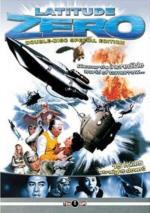 |
|

|
Based on a popular (and by all accounts, very strange) 1941 radio serial, Latitude Zero is a Japanese/U.S. co-production for which high hopes we obviously held; Sadly, for various reasons, it remains a very minor player in the Toho stable, which makes it all the more remarkable that Media Blasters has given it the royal treatment. Two scientists (Akira Takarada and Masumi Okada) and a reporter (Richard Jaeckel) face certain death when an underwater volcano explodes near their bathysphere. They are rescued by Captain McKenzie (Joseph Cotten) and his super-advanced sub, the Alpha. They are taken to Latitude Zero, McKenzie's underwater science Utopia, with an artificial sun and a group of researchers laboring for the betterment of mankind. Every paradise, of course, must have its serpent. In this case, it is McKenzie's old comrade, Malic (Cesar Romero), who wants to rule the world, though we're not sure exactly how. Malic's own super-sub, the Black Shark, kidnaps a scientist on his way to Latitude Zero, and it is up to McKenzie and his new two-fisted friends to rescue the poor man and his captive daughter. Latitude Zero is a movie of bizarre contrasts, often delirious, with Malic's army of giant rats, literal bat-men, and a winged lion with a human brain; but also it seems very juvenile, as if the American producers could not leave behind Romero's campy Batman baggage. At least it seems like a kid-friendly adventure movie until McKenzie's aide-de-camp Dr. Barton (Linda Haynes) shows up in another of her decolletage-baring costumes. Not fish nor fowl, Latitude Zero was neither a critical nor a financial success, though those same problematic qualities... and some difficulties in seeing it due to rights issues... enabled it to establish something of a cult following. Then, anything by director Ishiro Honda is worth checking out, and Eiji Tsubaraya's miniature work (his second-to-last film, and the last with Honda) is top-notch as always. Dedicated fans of their other work may be able to look past the saturday matinee trappings and find much to like, but it will take some dedication.
First off, props to Media Blasters for using the original Japanese poster art for its box, cluttered and breathless in that way in which Toho always seemed to excel. Once you get past the minute and a half of Media Blasters logos (yes, still a sore point with me) you will be treated to one of the most pristine, gorgeous film prints it has been my pleasure to see.
Disc one holds the English version of the movie, which is the original version - Latitude Zero was shot in English, with Takarada and Okada learning their lines phonetically. It also has Special Announcement, which is the Japanese and American trailers for the movie, and a Photo Gallery of various posters and lobby cards. Disc Two has the Japanese version (which runs fifteen minutes shorter than the American version), a series of interviews with some surviving Japanese crew members (with not much good to say about the Western ways of making movies) and Japanese previews (some subtitled, some not) for Zebraman, Atragon, Frankenstein Conquers the World (or here, Frankenstein vs Baragon), and Nezulla, the Rat Monster. Truth to tell, there is an unannounced third DVD in the set, in a plain windowed envelope. It has previews (again with inconsistent subtitling) for all of Media Blaster's Tokyo Shock movies, arranged by genre. A very nice bonus for trailer fans, or fans of Asian cinema, indeed. Dr. Freex, 8/14/2008 |
|
|
|
|

